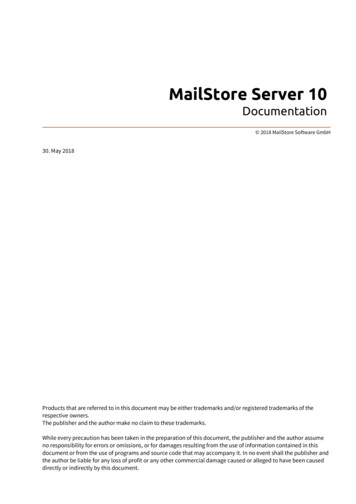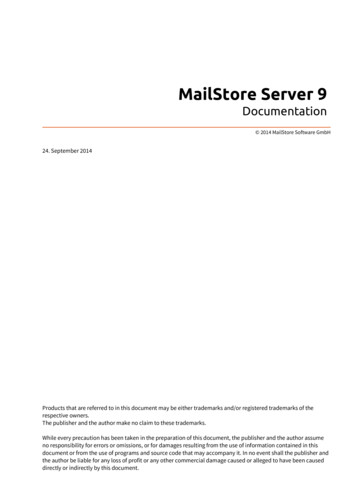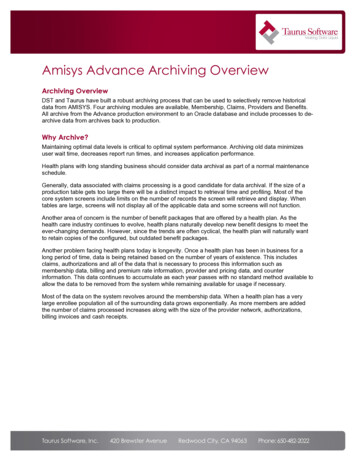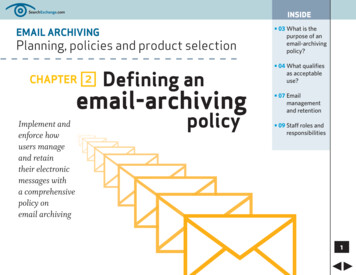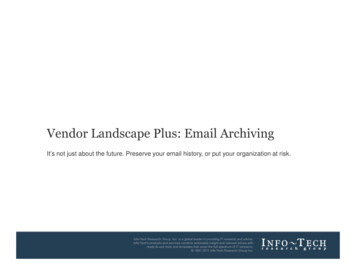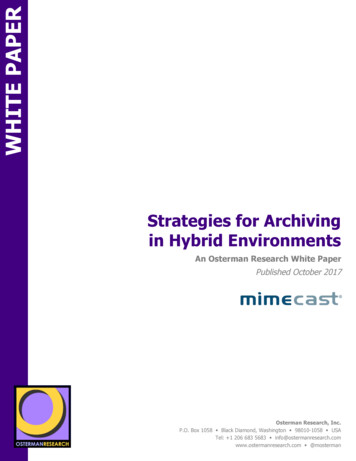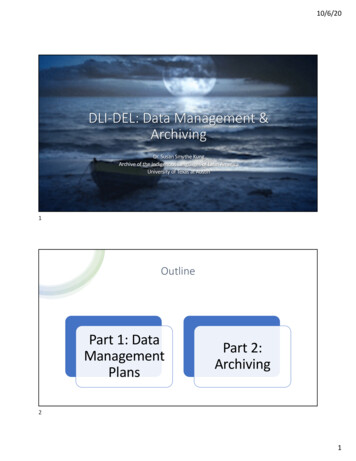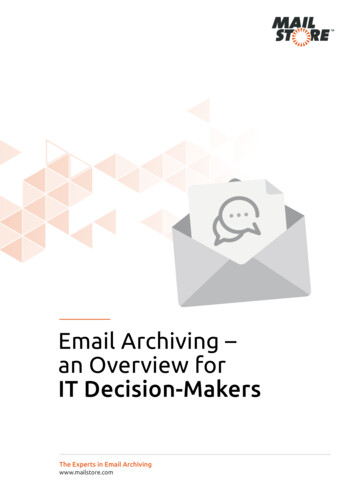
Transcription
Email Archiving –an Overview forIT Decision-MakersThe Experts in Email Archivingwww.mailstore.com
p. 2Email Archiving – an Overview for IT Decision-MakersContentsp. 3Challenges in Email Management: Legal, Technical, Financialp. 5The Solution: Email Archiving – an Indispensable Part of Corporate IT Strategyp. 6Email Archiving vs. Backupsp. 8The Benefits of Email Archiving for the IT Departmentp. 9The Benefits of Email Archiving for Businesses Beyond ITp. 11Does Email Archiving Help a Company to Comply With the EU GDPR?p. 13Check List: How to Find the Right Email Archiving SolutionWhy Email Archiving? A Summary for IT Managersand System AdministratorsNot only is email an important means of digital communication, but it is also a comprehensive and valuable information resource for companies. Managing this resource, however, can be a challenge. As a rule, data sent by email are not usually stored at a separatelocation, but reside in workers’ mailboxes, giving rise to fragmented data silos comprisingyears of knowledge and expanding on a daily basis. Preserving this knowledge over time sothat it can be used efficiently by colleagues can play a crucial role in a company’s success.In this white paper, we’ll explain why email archiving should be part of any comprehensive IT strategy and what benefits it can deliver for an IT department and the companyas a whole.The Experts in Email Archivingwww.mailstore.com
p. 3Email Archiving – an Overview for IT Decision-MakersChallenges in Email Management:Legal, Technical, FinancialMost companies have excellent email servers or groupware solutions for email communication. But these systems were never designed to store and provide large amounts of dataover long periods of time, and this can give rise to legal, technical, and financial issues.Taking Regulatory Compliance Into AccountDepending on the country and industry, processing emails and storing this data over timeso that it is permanently available can be subject to different legal and regulatory requirements. Often, industries sending and receiving large volumes of sensitive, personal databy email are subject to stricter regulations. These include the healthcare sector and thefinancial industry, as well as public authorities and educational institutions.In the event of a legal dispute (e.g. where emails are being used as evidence) or where datasubjects are asserting their rights under the EU’s General Data Protection Regulation (rightof erasure/right to access data, right to restrict processing, etc.), a company’s managementor legal/compliance team must be in a position to search for and retrieve data from itsentire email stock efficiently at all times.Meeting the Technical RequirementsIn order to put this communication resource to effective, productive use, users need tohave access to all their emails simply and quickly at all times. Ideally, older emails thathave already been deleted from the mailbox – either by accident or in order to free upspace in the mailbox – will be accessible, too. Searching for emails should be simple andintuitive, and the same applies to recovering any deleted mails and attachments; ideally,this should be possible without involving your local IT service desk. However, self-servicefeatures like these are not normally a feature of an email or groupware solution.The Experts in Email Archivingwww.mailstore.com
p. 4Email Archiving – an Overview for IT Decision-MakersFinancial ImplicationsThe time, effort and resources needed to continuously manage performance problemsaffecting email servers and storage capacities constitute a considerable portion of anIT department’s budget. Daily requests by users to retrieve archived emails or recovercorrupt, locally stored emails (e.g. in the form of PST files) eat up further resources.Productivity also tends to suffer if users have to spend lots of time browsing throughfolders for old emails or searching for specific items of information.The Experts in Email Archivingwww.mailstore.com
p. 5Email Archiving – an Overview for IT Decision-MakersThe Solution: Email Archiving – An Indispensable Partof Corporate IT StrategyDue to the increase in email traffic and the tighter regulations seen in many markets inrecent years (e.g. the GDPR in the EU and the CCPA in California), we would advise all ITdecision-makers to address the issue of email archiving proactively. The option of archiving relevant emails professionally as the cornerstone of a comprehensive email management concept should be a part of every IT strategy. Without an archiving solution in place,email governance policies issued by a company’s management will be difficult, if not impossible, for the IT department to implement on its systems. Such directives could includeretention policies for specific emails, centralized archiving of distributed emails (e.g. localPST files, emails that exist solely on email clients), and the ability to restore historic emails.How Does Email Archiving Work?The primary objective of any email archiving solution is to make sure that email dataremains available and retrievable over time. To do this, the archiving solution stores copiesof all emails in a central archive, thus ensuring the availability and security of data overmany years.The email archive supplements an existing email system (which can, of course, continueto be used as before). The administrator configures which emails are to be transferred tothe archive and when, and whether the emails, once archived, should be deleted from themailboxes on the email server. Ideally, the archive will be able to manage very large volumes of data efficiently.The Experts in Email Archivingwww.mailstore.com
p. 6Email Archiving – an Overview for IT Decision-MakersEmail Archiving vs. Backups:Creating Backups Is Not the Same as Email Archiving!“We already back up the data on our email servers. There’s no need to archive the dataseparately”. IT managers who subscribe to this premise are taking a considerable risk,because backups are no substitute for a professional email archive.Although backups and archiving are both key elements of any safety-conscious business,they pursue different objectives (see table below): he primary purpose of a backup is to support the Disaster Recovery (DR) processTwithin the framework of a Business Continuity (BC) concept. Backups protect important data (ideally, including the email archive itself) usually over short or mediumtime frames so that this information can be restored as required. This guarantees thatbusiness-critical systems and data remain available even in an emergency (e.g. systemfailure or a ransomware attack). he aim of archiving, however, is to store emails for many years in a form that is faithTful to the original, easy to find, and permanently available. This forms the basis fora professional information management strategy that takes all legal and regulatoryrequirements into account. Therefore, in addition to backups, email archiving is one ofthe most important instruments underpinning a company’s Business Continuity (BC)policy.Emails should never simply be deleted. Archiving emails is important so that the information contained in them is available at all times. However, the archive itself shouldalso be part of the backup plan and protected against system failure.The Experts in Email Archivingwww.mailstore.com
p. 7Email Archiving – an Overview for IT gEliminate mailbox quotasEliminate PST filesReduce storage requirements through de-duplicationand compressionReduce the workload of email servers and simplify backupand restore processesProvide complete, tamper-proof and long-termemail retentionHelps to meet compliance requirementsAssistance with eDiscovery scenariosFull-text indexing of emails for fast searchesEnd users: restore lost emails quickly and easilyThe ratings in this table are based on the fundamental concepts of backups and emailarchiving. The functions of an email archiving solution discussed here are based onthe range of functions provided by MailStore Server. The functions of backup andemail archiving solutions may vary, depending on the vendor.Fully appliesAppliesApplies to a lesser extentThe Experts in Email Archivingwww.mailstore.comPartially appliesDoesn’t apply
p. 8Email Archiving – an Overview for IT Decision-MakersThe Benefits of Email Archiving for the IT DepartmentIT decision-makers are coming under increasing pressure due to the burgeoning tideof data. The time and resources needed to guarantee that such data remains secure,retrievable and permanently available are increasing all the time. Email archiving canhelp significantly reduce this pressure: he option of deleting emails from the server the moment they are archived helps cutTstorage requirements, not to mention the workload on the email server and the associated running costs. The data volume on the email server can be kept at a constantlylow level and mailbox quotas become obsolete. he risk of irretrievably losing emails is minimized. Even regular backups of the emailTserver (e.g. using incremental backups) cannot eliminate this risk entirely. Important:archives should always be backed up as well! rchiving reduces the complexity of the backup and restore process. Keeping data volAumes on the email server low means that the backup process is quicker and requiresless storage – and, in a disaster-recovery scenario, restoring the mail server from thebackup volumes is much faster. dministrators can consolidate emails stored decentrally and archive simply. ThisAhelps avoid problems caused by PST files and emails being distributed across localuser systems. onsolidating emails that have been stored decentrally and fully archiving all emailsCmakes it easier for an IT department to migrate to another email platform, for examplein the case of a change of provider.I f the archiving tool provides a self-service search and retrieval function, IT departments will no longer have to invest time and effort in restoring emails from old backups. The average user can access his archive at will without assistance.The Experts in Email Archivingwww.mailstore.com
p. 9Email Archiving – an Overview for IT Decision-MakersThe Benefits of Email Archiving For Businesses Beyond ITWhen email archiving as a key element of email management is integrated in a company’sIT strategy and information management policy, this can deliver benefits in all areas of acompany and help mitigate the financial, legal and technical challenges.Protect Against Data LossIt is always possible for employees to delete important emails – whether by accident, outof ignorance, or even with malicious intent. Scenarios in which a user deletes the entirecontents of a mailbox on leaving the company are particularly serious. Around the globe,critical data is lost this way every day. With the aid of an email archiving solution, however,all existing and future inbound and outbound email traffic can be fully archived, allowingemails to be archived before they even reach the user and data loss avoided.Helps With Email ComplianceEmail archiving can support compliance with statutory and regulatory requirements, theresponsibility for which usually lies with the company’s management. A breach of archiving duties can result in fiscal penalties and, in some cases, even litigation under civil law.For most companies, therefore, it makes sense to archive all relevant emails and file attachments completely and in a form that is tamper-proof and permanently available andretrievable. Email archiving can deal with this task effectively, while also facilitating theuse of emails as evidence in a court of law. The EU eIDAS regulation has reinforced the probative value of electronic documents in the European judicial region. In the USA, it is notuncommon for emails to be used as evidence in court. Here, they often form the basis ofcomplex eDiscovery proceedings in which reams of corporate emails are trawled throughin order to locate and preserve a specific item of information. Therefore, a company shouldbe in a position to run a search through its entire email stock in the case of a discoveryscenario and have the data exported in a standard format, where necessary.The Experts in Email Archivingwww.mailstore.com
p. 10Email Archiving – an Overview for IT Decision-MakersReduce IT Cost and EffortEmail archiving enables a business to cut the email management costs incurred by thecompany’s IT department. Storage requirements can often be reduced significantly byswapping out emails from the mail servers. At the same time, the IT department is sparedthe laborious task of restoring specific emails from backups or email servers in response toa user request. IT experts can invest the freed-up capacity in more important projects.Availability of Business-Critical DataA critical aspect when backing up email servers is the time lag before data can be restored following a loss event. In the worst case, the company will not be able to accessbusiness-critical information contained in emails during the downtime, which can oftenlast several hours or even days. An independent archive can eliminate this problem. If theemail server fails or data are lost, all archived emails will ideally remain available for allsearch and recovery operations. Business activity continues without interruption.Increase User Productivity in Everyday BusinessEnsuring that emails, as a critical information resource, are available quickly, comprehensively, at any time in any place can help increase a company’s productivity.In the case of some email archiving solutions, emails in the archive even remain accessiblevia the user’s customary folder structure. Also, given that an archiving tool renders mailboxquotas unnecessary, the self-service features offered by many archiving solutions meanthat users no longer have to invest precious time in reorganizing mailboxes or clearing outinsignificant emails. In the meantime, the IT service desk is free to get on with more important tasks.Fast ROIUsing an archiving solution for emails reduces the workload on the IT department and cansignificantly cut storage costs. As a rule, the solution will pay for itself within a short periodof time. Companies are also able to mitigate their exposure to financial risks stemmingfrom data loss or legal disputes.The Experts in Email Archivingwww.mailstore.com
p. 11Email Archiving – an Overview for IT Decision-MakersDoes Email Archiving Help a Company to ComplyWith the EU GDPR?The European Union’s General Data Protection Regulation (GDPR) harmonizes data privacylaws in Europe, placing an emphasis on the protection of personal data. In different areas,therefore, companies must ensure that personal data is handled in a manner that complieswith the terms of the GDPR. Breaches can attract fines of up to EUR 20 million or 4 percentof a company’s total global turnover of the preceding financial year, whichever is higher.Complying with the data privacy rules set down in the GDPR is a corporate-wide challengeinvolving numerous processes and procedures. Email archiving tools can help businesses meet several core requirements of the EU regulation. Even companies outside the EUwould be well advised to familiarize themselves with the GDPR if they intend to processthe personal data of EU citizens during everyday business.Email archiving tools can help to comply with the following GDPR articles, for example: ight of access (Art. 15 GDPR): The powerful search function in an email archivingRsolution allows emails and file attachments concerning e.g. a specific customer or employee to be located and exported quickly. Companies are in a position to provide thirdparties with information, whenever required. ight to erasure (Art. 17 GDPR): Documents containing personal data may also needRto be stored in an audit-proof manner, i.e. protected against erasure and manipulationduring statutory or regulatory retention periods. Of great help here are functions thatsupport deletion/retention management and allow the company to comply with GDPRrequirements. ight to data portability (Art. 20 GDPR): Natural persons are entitled to request theRdisclosure of any personal data concerning them and have it provided in a structured,commonly used and machine-readable format, and to have this data transferred toanother “controller”. An archiving solution should comply with the right to data portability by providing an export function that supports all common email formats (EML,MSG, PST). ight to object (Art. 21 GDPR): The GDPR stipulates that if a company wishes to proRcess personal data, it must demonstrate that it has obtained the data subject’s consent to do so. The data subject must also be able to withdraw that consent. The emailarchiving software captures consent and the withdrawal thereof expressed by emailThe Experts in Email Archivingwww.mailstore.com
p. 12Email Archiving – an Overview for IT Decision-Makersin an upstream system (e.g. an online shop, email marketing system, etc.). Resultingtransaction mails – for example opt-ins of email marketing or lead management systems – are copied to the email archive.Orderliness and transparency in handling personal data are key requirements when itcomes to complying with the GDPR – from the collection and storage/accessing of the data,up to the point when the data is deleted. Deploying powerful email archiving software is,therefore, an important step on the path to GDPR conformity.The Experts in Email Archivingwww.mailstore.com
p. 13Email Archiving – an Overview for IT Decision-MakersCheck List: How to Find the Right Email ArchivingSolutionWhen choosing email archiving software, all legal, economic and technical requirementsshould be taken into account in addition to corporate interests. Preparing a list of requirements can make it easier to find an appropriate solution:Flexible storage management: Choosing an archiving software that uses methods such as de-duplication and compression can help reduce storage requirements by as much as70 percent. Flexible storage management also means that fast, expensive storage mediacan be reserved for current emails; a good system will always transfer older, less frequentlyaccessed emails to slower, cheaper storage.Easy to install and run: Simple installation makes it easier to get the software up and running, while intuitive handling facilitates rapid implementation of the archiving system.Having all the necessary components, e.g. database systems, integrated during setup helpssave time, while reducing costs and administrative effort.Archiving existing emails: When you roll out the new software, it should be no problem to archive current emails stored in individual mailboxes, public folders, and shared mailboxesand email files.User friendly: Users should be able to access their archived emails as usual via Microsoft Outlook, browser, or while on the road with a tablet or smartphone.Self-service for the user: Not all archiving solutions allow staff to access email volumes by themselves. But the workload on an IT department can be reduced significantly if the newsolution allows users to work productively within the archive.Certification: For many companies, it’s important that the software permits GDPR-compli ant working standards and, where required, boasts appropriate certification.Flexibility: The archiving software should support all conventional email systems and archiving methods. Ideally, it should also be possible to realize customized applicationscenarios via an integrated API.Fit for Purpose: Your archiving tool must be a good fit for the size and requirements of the business. For example, it is rarely the case that an SMB will need a large enterprise solution,rather software that is tailored to the small or mid-sized company in terms of functionalscope and total cost of ownership (TCO).The Experts in Email Archivingwww.mailstore.com
p. 14Email Archiving – an Overview for IT Decision-MakersAbout MailStoreMailStore is specialized in the development of innovative email archiving solutions forsmall and mid-sized businesses. With tens of thousands of corporate customers in morethan 100 countries, MailStore is one of the global leaders in their field. Their products andsolutions are used by small and medium-sized businesses from all sectors, as well as bypublic and educational institutions.MailStore’s goal is to apply the best available technologies to support their customers inmaking efficient and sustainable use of email as one of the most valuable and comprehensive information resources of our time and to help them to meet a growing number ofcompliance requirements.Contact your IT service provider for advice on email archiving.Grafik Titelseite: Designed by Freepik, Smashicons (Flaticon.com)The Experts in Email Archivingwww.mailstore.com
email archiving solutions may vary, depending on the vendor. p. 8 er IT ecision-Makers The Experts in Email Archiving www.om The Benefits of Email Archiving for the IT Department IT decision-makers are coming under increasing pressure due to the burgeoning tide of data. The time and resources needed to guarantee that such data remains secure,
